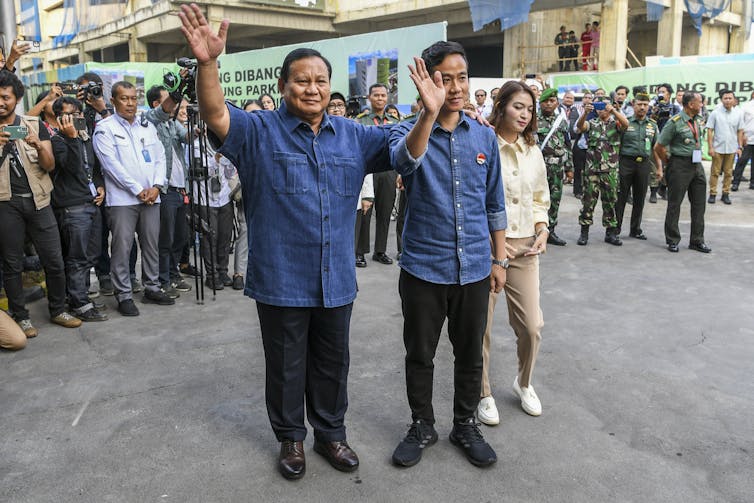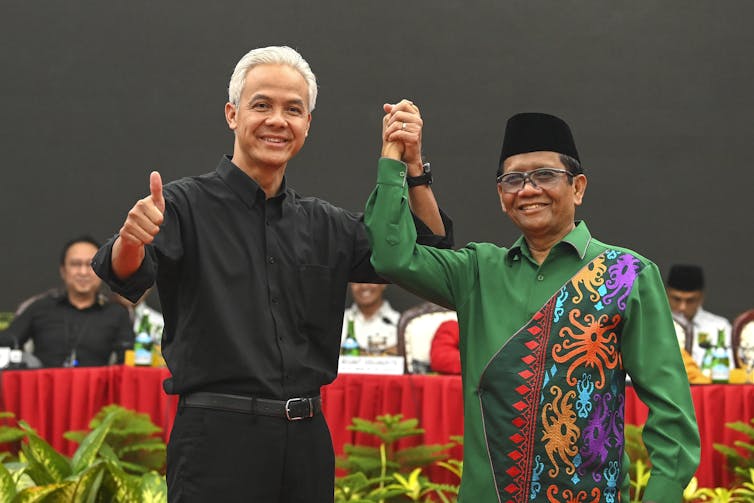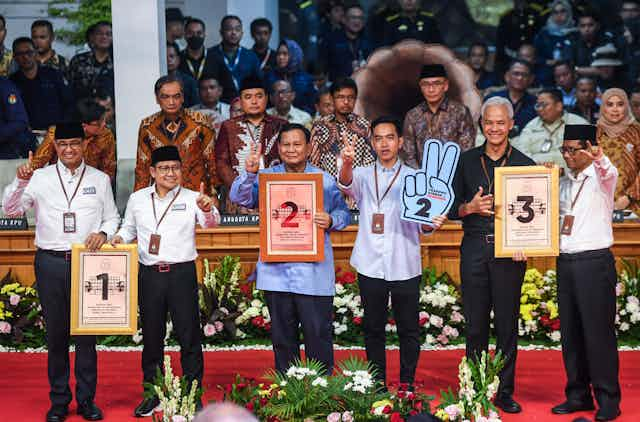In just over two months, Indonesia will hold one of the biggest one-day elections anywhere on Earth. More than 200 million eligible voters will take part across Indonesia’s 6,000 inhabited islands – along with 1.75 million people in the diaspora – to elect a new president, vice president and members of the People’s Consultative Assembly at both the national and regional levels.
The Election Commission has announced three pairs of candidates for president and vice president who will contest the election on February 14. The campaign period kicks off Tuesday.
A number of political observers have said the presence of three presidential candidates, instead of the usual two, would be good for Indonesia’s political stability as it could prevent deepening polarisation among the main parties’ supporters.
In the 2014 and 2019 elections, which featured only two candidates, Indonesia witnessed great polarisation between the two camps. Next year, the voters will have more alternatives.
On the other hand, some scholars have warned the 2024 presidential election will be a test for the country’s democracy because the contenders have either all run for office before or are backed by established power players. As a result, Indonesians do not really have many new candidates with fresh ideas to choose from.
Here is a brief rundown of the current field of candidates, and who backs them.
1. Anies Baswedan, the professor
Anies is the only presidential hopeful who does not represent a single political party. However, his candidacy has been endorsed by the National Democratic Party, Indonesia’s fifth-largest party, the Islamist-based National Awakening Party (PKB) and the conservative Prosperous Justice Party (PKS).

Prior to his political career, Anies was a well-known, US-educated scholar with a doctorate in political science. He was born into an academic family – both of his parents are professors. He then became a lecturer himself, as well as a rector. After President Joko “Jokowi” Widodo was elected in 2014, he was appointed minister of education.
In 2017, Anies won the Jakarta governor election with the support of hardline Islamist groups. Anies is known for using religious identity issues to attract support from conservative Muslim groups.
In an attempt to shed the label of “identity politician”, though, Anies has chosen Muhaimin Iskandar as his running mate in next year’s election.
Muhaimin is the chairman of PKB, which has strong affiliations with Indonesia’s largest Muslim organisation, Nahdlatul Ulama. This group has a decades-long reputation as a moderate Islamic entity that promotes pluralism and tolerance.
A study has shown a majority of Indonesians view Anies positively, thanks to sympathetic media coverage. He is framed as intelligent, polite, firm and, of course, religious.
2. Prabowo Subianto, the military man
Prabowo, a former army general, is the current chairman of the Gerindra Party, the second-largest in parliament. He is also the minister of defence.
Prabowo has long been linked to the kidnapping and disappearance of students and activists who opposed former dictator Suharto’s authoritarian regime in the late 1990s, as well as other alleged human rights abuses, including in East Timor and Papua. At that time, he was the commander of the Indonesian Army special forces.

Prabowo, the former son-in-law of Suharto, has repeatedly denied all of the allegations.
The 2024 race will be Prabowo’s third attempt at winning the presidency; he previously lost twice to Jokowi. He also lost in the 2009 vice presidential race as the running mate of Megawati Sukarnoputri, who won the presidency.
Prabowo was once Jokowi’s rival; now he is his ally. In a surprise, he has picked Gibran Rakabuming Raka, Jokowi’s eldest son and the mayor of Surakarta, as his running mate.
The decision followed a controversial Constitutional Court ruling in October on the 2017 Election Law. The law says candidates for presidential or vice presidential office must be at least 40 years old, but the court ruled there could be an exception if the candidate has previously held elected office as a regional head.
This ruling paved the way for Gibran, who is just 36 years old, to run for vice president. He has been a mayor for nearly three years.
Analysts argue this is part of an agenda by Jokowi to establish a political dynasty. The Constitutional Court is led by Justice Anwar Usman, Jokowi’s brother-in-law, and Gibran’s uncle. Since the ruling, he has been dismissed dishonorably for breaching the court’s ethics.
Prabowo has risen in the polls since picking the president’s son as his running mate.
Read more: A twist in Indonesia's presidential election does not bode well for the country’s fragile democracy
3. Ganjar Pranowo, the populist
Ganjar Pranowo is a former governor of Central Java, Indonesia’s third most-populous province. He is a member of the Indonesia Democratic Party of Struggle (PDI-P), the country’s largest political party.
He will be contesting next year’s election with Mohammad Mahfud Mahmodin (commonly known as Mahfud MD), who is currently a minister in Jokowi’s government and the former chief justice of the Constitutional Court.

Months ago, many predicted Jokowi would throw his support to Ganjar as his successor. This is because Jokowi and Ganjar are from the same political party, come from the same hometown and have both embraced Javanese culture. In Indonesian politics, the elites are usually strong defenders of their culture, and Javanese have dominated the country’s politics since colonial times.
Political communication scholars have also noted the populist Ganjar is the only political figure with a similar “down-to-earth” leadership style as Jokowi.
However, there’s been a twist in the plot. With his son now running with Prabowo, Jokowi is widely believed to back the former general.
Ganjar has consistently polled among the top candidates running for president in recent years, but has never been a clear favourite.
In March, Ganjar sparked a public outcry after strongly opposing the participation of the Israeli soccer team in the FIFA U-20 World Cup that was supposed to be held in Indonesia, citing his support for Palestinian statehood. This caused FIFA to strip the tournament hosting rights from Indonesia.


